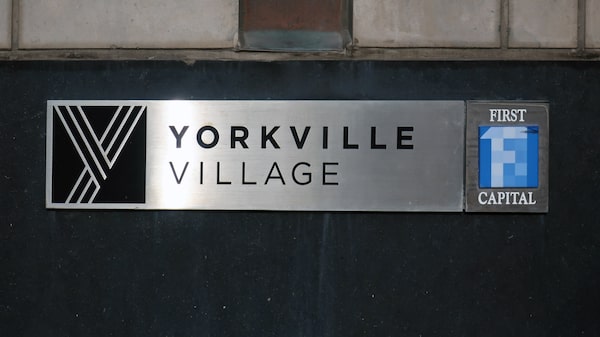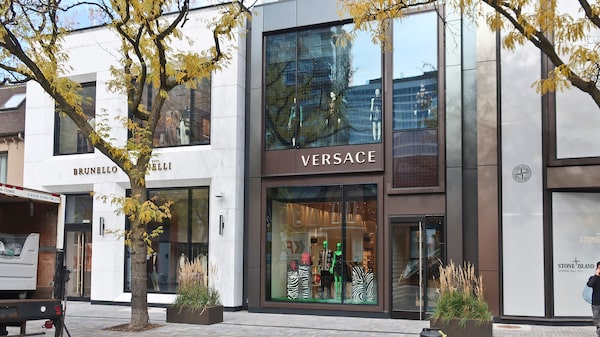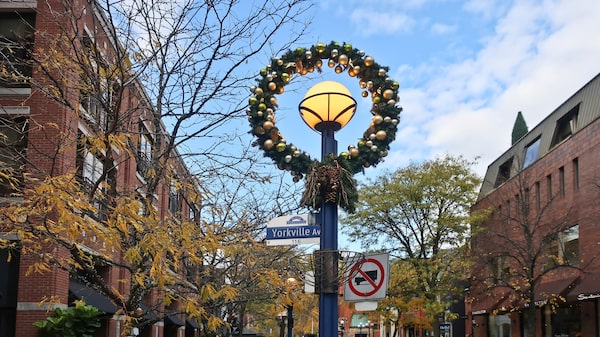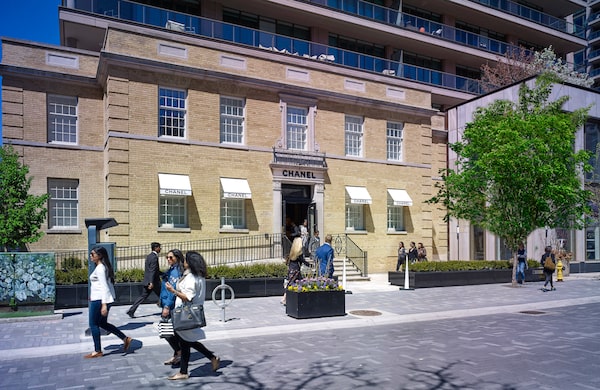
The Hazelton Hotel, in Toronto's trendy Yorkville neighbourhood.Wallace Immen/The Globe and Mail
Toronto’s Yorkville neighbourhood has come a long way from the 1960s, when cheap rents for its Victorian row houses attracted artists and trendsetters who populated the area with galleries and music clubs that featured up-and-coming talents such as Gordon Lightfoot, Joni Mitchell and Neil Young.
Today, the Bloor-Yorkville area’s eclectic low-rise streets are ringed by high-rise office and condo towers whose tony retail tenants including Holt Renfrew, Gucci, Birks and Tiffany – and attract so many fashionistas, the zone is nicknamed the Mink Mile.
According to a new study by Chicago-based commercial real estate brokerage Jones Lang LaSalle Inc. (JLL): “The luxury stretch of Bloor Street West between Yonge Street and Avenue Road boasts Canada’s highest retail lease rates, which averaged in 2019 about $285 a square foot, putting Bloor Street ahead of Robson Street in Vancouver (at $225 a square foot) as well as in line with upscale streets such as Newbury Street in Boston, and Lincoln Road in Miami.”
High-end retail experience is pushing its boundaries

With its abundance of luxury retailers, the area is nicknamed the Mink Mile.Wallace Immen/The Globe and Mail
The affluence of this retail location influences nearby streets, spilling north to the area’s namesake Yorkville Avenue.
Turns out this northern stretch of Yorkville Avenue between the Hazelton Hotel at 118 Yorkville Ave. and Bellair Street has seen rents nearly double over the course of three years, currently averaging between $250 and $275 a square foot, JLL found.
By comparison, leases on Toronto’s Queen Street West average $100 a square foot, Robson Street in Vancouver $225 and Saint-Catherine Street in Montreal $210, JLL reports. Of course, those numbers pale in comparison to New York’s upper Fifth Avenue, where rents can reach US$2,720, the Beverly Hills triangle in Los Angeles that can command US$1,100 and Oxford Street in London where prime rents are the equivalent of US$775.
Growth in upscale shopping area isn’t an accident
Yorkville’s launch into the upper echelons didn’t happen by accident, though. Even a few years ago, there was speculation that with shifts in retailing toward more online shopping and a retrenchment of brands that the zone north of the Mink Mile would fall into decline.
Yorkville was getting decidedly shop worn by 2011, when First Capital Properties, a subsidiary of First Capital Realty Inc., acquired Hazelton Lanes, a 1970s shopping mall at the corner of Avenue Road and Yorkville Avenue.
To pump life into the area, First Capital developed a long-term vision for Yorkville that started with a total renovation of the old mall – to give it more street presence. The redevelopment also allowed for a rebranding and the mall became known as Yorkville Village.

First Capital rechristened Hazelton Lanes as Yorkville Village.Wallace Immen/The Globe and Mail
Over the past eight years, First Capital has purchased and reconfigured several stretches of Yorkville Avenue where Victorian homes had been converted to shops in the 1970s and 80s. The property redevelopment and management firm also took a majority position in the Hazelton Hotel, which was redesigned and relaunched as a preeminent luxury boutique hotel that is at the core of Yorkville’s luxurious experience.
“We are reinventing ourselves every day,” says Gregory Menzies, executive vice-president of First Capital Realty Inc., and project lead for Yorkville Village.
“Yorkville is almost a perfect storm, where you have tremendous amount of density and tremendous amount of high-net worth,” Mr. Menzies says.

With the number of condo units in the area expected to double in the next two years, Yorkville retailers can tap into an expanding base of potential customers.Wallace Immen/The Globe and Mail
There are about 11,000 condominium units in the immediate area and that’s destined to double in the next two years based on what is planned for the area and what is currently under construction.
Add to this the tourism and the business community along Bloor Street and the University of Toronto, and the area is rich in potential customers, Mr. Menzies says.
Trend in high-end retailing requires ongoing community support
In the past, many brands shifted their flagship stores into enclosed malls, but there’s now a shift back to brands – particularly the higher-end and exclusive name brands – having their main flagship stores at street level in Yorkville, the JLL study found.
For example, the 102-108 Yorkville Ave. block of properties, which are new builds done by First Capital Properties, boasts flagships of many of fashion’s most exclusive names, including Brunello Cucinelli’s largest North American store at 8,200 square feet spread out on three levels of retail space and Versace with two floors of retail space totalling 3,000 square feet.

The block of properties at 102-108 Yorkville Avenue, which includes a Versace store and Bruno Cucinelli's largest North American space.Wallace Immen/The Globe and Mail
Upscale Italian fashion retailer Stone Island is also completing a store which is scheduled to open before Christmas this year.
At 98 Yorkville Ave., Chanel’s flagship opened in a renovated yellow brick building that a century ago was the original Mount Sinai Hospital.
While the trend in high-end retailing is as much a developer’s vision as it is a retailer’s desire, a lot of the growth in this luxury retail space can be attributed to continual community-building efforts.
“We work in collaboration with other landlords and retailers and galleries in the area to create a sense of neighbourhood,” says Melissa Campisi, First Capital’s director of strategic partnerships and event management.
“People are always coming to us at events with ideas about other things we could do that involve their group. That helps grow the community,” Ms. Campisi says.
To keep things fresh and attract repeat customers, there are events throughout the year and a variety of seasonal attractions. These days, Ms. Campisi has been extremely busy preparing Yorkville Village for the holiday season.

Yorkville, dressed up for the holiday shopping season.Wallace Immen/The Globe and Mail
“We have a warehouse filled with holiday décor and we add more every year so what customers see and experience is always different.”
For instance, one new feature this year is a popup holiday market that features stocking stuffers, which, in this high-end retail district, are defined as gifts under $75.
Events and attractions throughout the year are key to building a retail experience
Throughout the year there are exhibits of artists and installations. For instance, at Toronto Fashion Week in September the area showcased iconic dresses worn in films by legendary actresses including Marilyn Monroe.
Another event this year, known as ‘Window Wars,’ helped to attract and entertain customers and visitors to the Yorkville area as well as attract attention to two properties on Yorkville Avenue that were for rent. In a space that was formerly an Anthoropolgie store, First Capital arranged fashion talks and charity events.
“Another adjoining window in a former Diesel store was also empty so we decided to bring in a way [that] blend[ed] fashion and real estate,” Ms. Campisi says.
Two art directors were challenged to try to top each other by creating window displays like film sets in the stores at the start of the Toronto International Film Festival. First Capital filmed the competition and shared it on social media, getting 1.5 million impressions.

Construction hoarding along Yorkville Avenue teases the arrival of a new tenant.Wallace Immen/The Globe and Mail
“It was a way [of] bringing Yorkville to everyone outside the community,” Ms. Campisi says, who adds, “it was a lot more fun than putting up a ‘For Lease’ sign in the windows.” (Plus, it resulted in signing a new tenant, whose name will be released in early 2020.)
“By creating entertaining events, we keep people coming back to shop. And the more shoppers there are, the more tenants want to have a visibility here,” she says.
But luxury boutiques with big windows aren’t enough. Restaurants, bars, and upscale services, such as the recently opened beauty spa Majesty’s Pleasure, have located on the upper levels of Yorkville buildings, where lease rates are more affordable and keep affluent clients coming regularly to the neighbourhood.
The future of the high-end retail experience at Yorkville

Chanel's Toronto flagship store is housed in a heritage structure that was once home to Mount Sinai Hospital.First Capital/Supplied
The Yorkville area is destined to become even more of a world-class retail destination as the area transforms with an unprecedented amount of construction and new leasing activity, predicts Dianne Lemm, executive vice-president retail at JLL, which completed the recently released lease rate study.
The trends are in favour of growth for luxury retail, concludes the 2019 Canadian Luxury Apparel Market report by retail marketing research firm Trendex North America.
According to the new report, the Canadian luxury apparel market will increase by 5.8 per cent in 2019 and by 18 per cent from 2019 to 2023, to reach $3.2-billion in sales within the next five years.
More importantly, report authors predict that the luxury sector growth rate will be nearly twice that of the overall clothing retail sector.
That should translate into more luxury store demand for Yorkville, Ms. Lemm says.
“It is an incredibly exciting time for Bloor-Yorkville,” she says. “There has been a real renaissance to the area that will continue to propel other luxury interest and activity and help to continue the growth of this destination-shopping area.